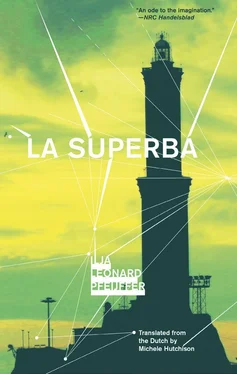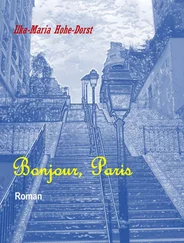Women in large, flapping, traditional robes sit on the street selling paper handkerchiefs and toothpicks. But they aren’t selling paper handkerchiefs and toothpicks — they are voodoo witches with the power, for the right price, to make a rival impotent or cause an unfaithful mistress to lose a leg. There are white witches and black witches — those who help and those who cause damage, but the difference is invisible to a northerner. They have another function apart from that. They usually sit in front of the door of the palazzo they live in, and for good reason. They are keeping watch. They share their houses with family members, sons and nephews, who deal drugs and get up to all kinds of other shady business, so it’s important to keep an eye on who is going into the building. And they’re all rolling in it. All you need is for one badly fitted stove gas bottle to explode and the witch’s quivering coven turns up in a Mercedes to deliver her to safety, her suitcases filled with gold on the back seat.
At night, when the butchers, hairdressers, and fruit merchants have let down their shutters and closed them with at least four padlocks, the Via di Pré becomes a warzone. Footsteps echo hollowly as you walk between the trenches, sounding just as suspicious to everybody else. The Senegalese are at war with the Moroccans, the South Americans with the Senegalese and the Moroccans, and the Moroccans with everyone. They use stones and bottles as ammunition. Sometimes they use ammunition as ammunition. There are sometimes fatalities, though you seldom read about them in the papers since the victims are illegals, and so officially don’t exist, and to prevent further problems, are whisked away as quickly as possible by their fellow countrymen. The police are of no help. They settle scores in their own way.
The only thing protecting you from being hit in the crossfire is your white skin. You’re irrelevant in the war between immigrants. To them, you’re just a stupid, weak, white outsider who doesn’t understand a thing. The gang members allow you, quietly and ignorantly, to trudge through a no-man’s-land armed in ways you have no knowledge of. But there are pickpockets in no-man’sland and they set their sights on your unsteady walk, your mobile phone, and the five euros you have left in your trouser pocket. The police are not players here. They avoid Via di Pré after sunset because it’s simply too dangerous.
2.
Cinzia lives there, just by the Commenda, on the top floor of a palazzo that’s been dilapidated since the Middle Ages. The stairs are so worn you could cook soup in them. She no longer has any neighbors, not really. She does have cracks in the wall from a gas bottle that exploded in the adjacent building. But she has the prettiest terrace in Genoa. You can see everything from her roof: the despairing labyrinth, the badly planned motorway, the lighthouse, and the port. The view of the port is magical. Slowly drifting skyscrapers like the MSC Fantasia and the MSC Poesia greet the city with three low hoots of their horns, while ferries leave for Sardinia, Sicily, Barcelona, and Africa. All of the boats together form a poignantly slow ballet of dreams of other places where it will be just as bad as it is here, but at least it won’t be here.
I was sitting with Cinzia on her terrace, thinking all these things, when he came in, carrying something heavy. He smiled happily. White teeth shone in his black face.
“Hey, Djiby,” Cinzia said. “What’s today’s gift?”
“I know exactly what it is,” he said. “Something heavy.” He found that terribly funny. “You know that’s my job — carrying heavy loads. Francesco has someone else for light loads. But he earns even less than me.” He set down his large bag in a corner of the terrace, giggling.
She introduced him to me. “Leonardo’s a foreigner as well, like you.”
“He might be a foreigner but he’s not like me. He doesn’t have to carry heavy loads. He’s allowed things I’m not allowed because his ears are translucent and his teeth are blacker than his face.” Grinning, he said goodbye. He began to sing on his way down the stairs. It sounded like “ Fatou yo .” It sounded melancholy. The sound died away as he descended to street level.
“He has keys to your house?”
Cinzia shrugged. “He’s a good boy. He’s one of Francesco’s, my landlord’s, slaves.”
“Do you rent?”
“He’s the owner of the entire palazzo. And I’ve heard he has dozens of buildings, mainly here in Via di Pré.”
“So he mainly rents them to Senegalese?”
“But he’s a good person. I think he has political ambitions, too, so he can’t allow himself to get a bad name as yet another slumlord exploiting illegal immigrants. And he loves Via di Pré. He wants more white people here and is really doing his best about that. That’s how I got this apartment.”
“So that his buildings will be worth more. If this weren’t such a black neighborhood.”
“But at least he’s doing something about it. The thing he had Djiby bring over is a sack of cement to repair the cracks in the wall made by the gas explosion. Many of them here on the terrace. See that crack there? Other landlords put fifteen Senegalese in an apartment and let the lot rot away.”
“And your friend Djiby, where does he live then?”
“I can see what you’re getting at, Leonardo, but it’s complicated.”
3.
I saw Djiby often in the days that followed, and in my neighborhood, Molo, too — a long way from Africa. Sometimes in the early mornings, Oscar had him put out the Gradisca’s tables, chairs, and umbrellas. After that he went to the fruit shops and fishmongers on Via Canneto Il Lungo to deliver heavy boxes or take empty ones to the trash. He rang on various bells to assist the helpless old ladies without a lift that he worked for, carrying bottles of water and other heavy things upstairs. I’d probably seen him before, before we’d been introduced to each other, but he hadn’t stood out. Now that I knew him, I always greeted him amicably. He chuckled as he greeted me back.
And then when I saw him once in the evening with some bracelets and other trinkets he was trying to sell, I invited him to join me at my table.
“What will you have? Are you a Muslim?”
“A beer’s good.”
“Small or large?”
“Depends on how much you’ve got to tell me.”
“Actually, I wanted to ask you something. You’re doing the telling.”
“In that case, a very large beer.”
The beer was brought. We clinked glasses. He began to laugh.
“Why are you laughing, Djiby?”
“At you, Leonardo. Because you’re funny. Because you have such a funny name.”
“Djiby’s an even funnier name.”
“Like Leonardo DiCaprio with his arms outstretched and then blub, blub, blub.”
“Actually my real name’s Ilja.”
He found that hilarious. “That’s a girl’s name.” He roared with laughter. “Would you like to be a girl, Ilja? Can I be the first one to fuck you if you do?”
“I wanted to ask you a serious question, Djiby.”
This made him laugh even more. “Blub, blub,” he said. He downed his beer in one. “I’ll be serious again tomorrow.”
“Serious?”
He slapped my shoulder. “I like you, girly Leonardo.”
4.
His full name was Djiby P. Souley. I asked him what the P. stood for. Laughing, he said he didn’t know. He’d thought of the P. himself because he wanted to have three initials: DPS, it looked chic, for later, when he was a rich, successful businessman.
“Is that what you want to be, a rich, successful businessman?”
“I am that already to my family back home in Senegal. It might be the biggest joke of the century.”
Читать дальше












